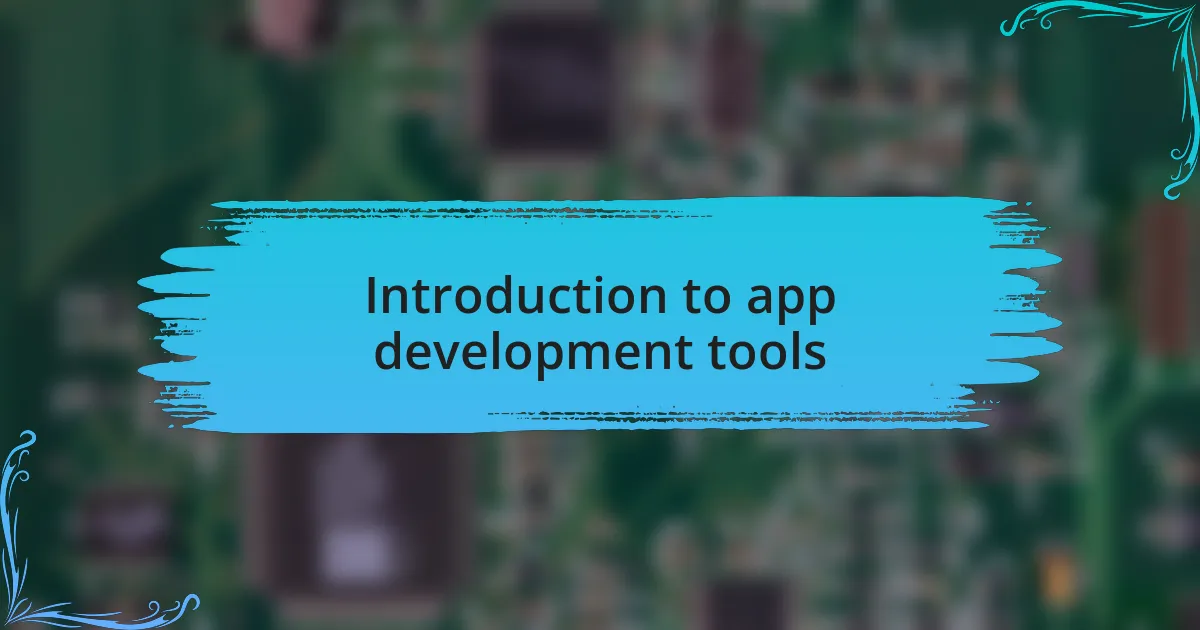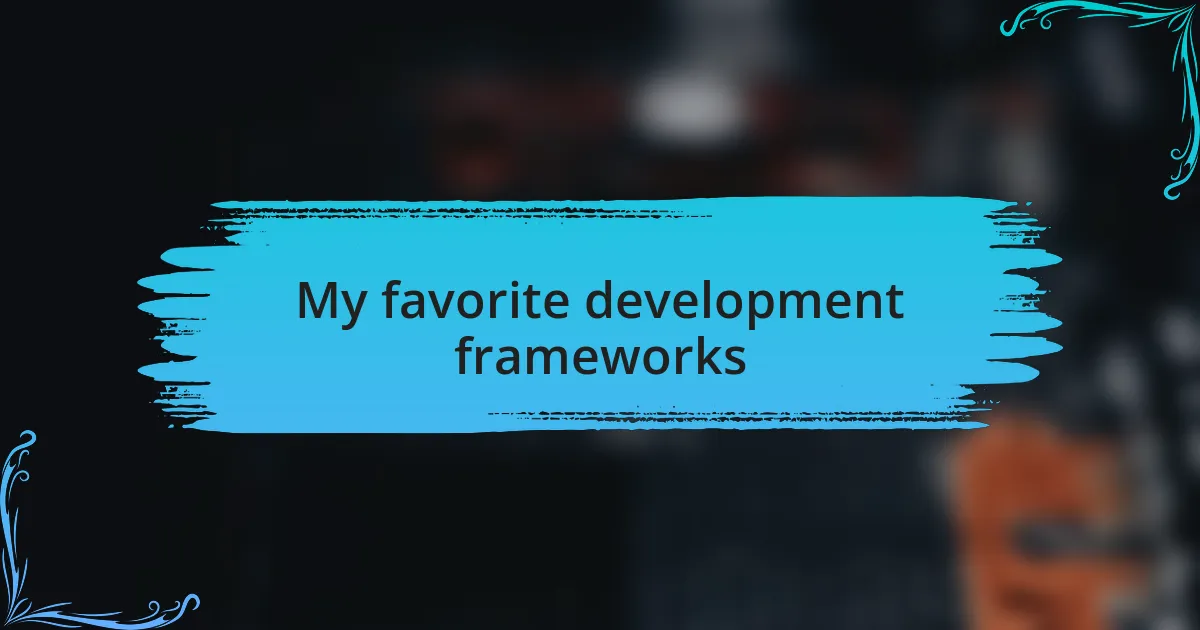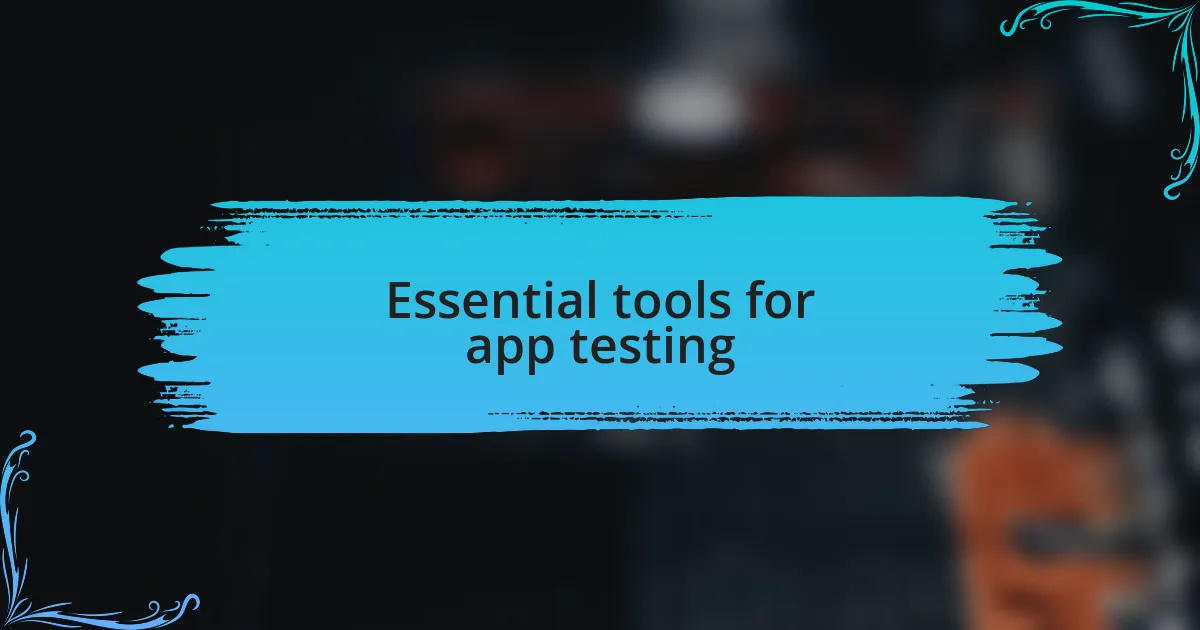Key takeaways:
- Choosing the right app development tools is vital for project success, impacting productivity and user experience.
- React Native, Flutter, and Xamarin are highlighted as preferred frameworks for their unique features and advantages in app development.
- Firebase Test Lab, Appium, and Crashlytics are essential tools for effective app testing, providing cloud testing, automation, and real-time performance feedback respectively.

Introduction to app development tools
When I first delved into mobile development, the vast array of app development tools felt overwhelming. I vividly remember spending late nights researching platforms, weighing their features, and feeling both excited and intimidated by the possibilities. Have you ever felt that rush of confusion when faced with too many options?
Choosing the right app development tools is crucial for your project’s success. Each tool comes with its strengths and challenges, and your choice can significantly impact productivity and the overall user experience. Personally, I’ve found that the right tools not only streamline the development process but also inspire creativity and innovation in my projects.
I often think about the integration of development tools into my workflow. There’s something incredibly satisfying about seeing an idea come to life effortlessly with the right resources at my fingertips. How do you approach selecting tools? It’s a question that, I believe, deserves deeper consideration as it shapes the development journey from concept to delivery.

My favorite development frameworks
When it comes to development frameworks, React Native stands out as one of my all-time favorites. I still remember the first time I built an app with it; the hot reloading feature blew my mind. It was incredible to see my changes reflected in real time, making the development process not only faster but also much more enjoyable. Have you experienced that joy of instant feedback when coding?
Flutter is another framework that has captured my attention lately. The flexibility it offers in crafting beautiful UIs is something I appreciate deeply. There was a project where I needed rapid prototyping, and Flutter allowed me to create a stunning interface in record time. How often have you faced tight deadlines, and the ability to quickly iterate becomes your lifeline?
Additionally, I have a soft spot for Xamarin, especially when working on cross-platform apps. It feels like a safety net, allowing me to share a significant portion of my code while still optimizing for both iOS and Android. I recall a project where this framework saved me countless hours of work, proving that sometimes, having a solid foundation makes all the difference. Wouldn’t it be great if every development phase felt this seamless?

Essential tools for app testing
When it comes to app testing, my go-to tool is Firebase Test Lab. There’s something incredibly satisfying about running tests across a range of devices in the cloud without having to physically manage multiple devices. I vividly recall a time when a bug slipped through during local testing, but thanks to Firebase, I could catch it instantly on all device configurations, saving me from a potential disaster. Have you ever experienced that sinking feeling when a last-minute bug appears?
Another indispensable tool is Appium, which provides the flexibility of automation for both Android and iOS apps. I remember working on a project where my testing needed to cover a variety of scenarios without the burden of manual testing. Appium made this possible, allowing me to focus on other critical tasks while ensuring that my app was functioning correctly across different platforms. It’s a relief when you can trust a tool to handle repetitive tasks efficiently, isn’t it?
Finally, I can’t emphasize enough the importance of using Crashlytics. It’s an eye-opener to receive real-time feedback on app crashes and performance metrics. I had a user report a crashing issue only to realize it was due to an edge case that I hadn’t considered. Artists often say that feedback is a gift, and with Crashlytics, it’s like receiving presents that help me fine-tune my app continuously. How much more could you achieve if you had such insights readily available?